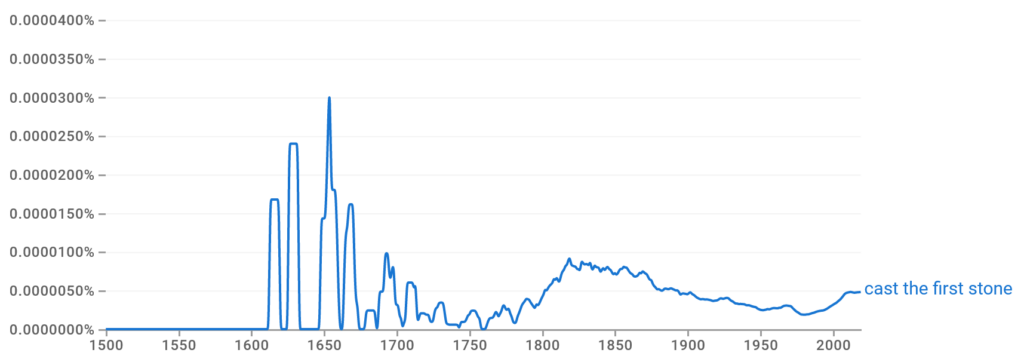Cast the first stone refers to the act of being the first to criticize or condemn someone, especially for a mistake, despite having similar flaws or faults. It’s a timeless idiom planted deeply in moral and ethical considerations, highlighting the hypocrisy of judging others when they’re not without fault themselves. Today’s more modern version might sound something like, “Who do you think you are?”
Idioms such as cast the first stone are phrases or expressions in the English language that have figurative meanings beyond their literal interpretations. They play an essential role in communication, adding color, creativity, and depth to the language.
My article digs deep into the meaning, origin, and correct usage of the idiom cast the first stone so that you fully understand how to slip it into a conversation or use it in your writing. It also provides the idiom’s variations, related phrases, and tips for effective usage. So, let’s check it out!

What Does the Idiom Cast the First Stone Mean?
The idiom cast the first stone means refraining from passing judgment or criticizing others, especially when the person passing judgment has their own faults or shortcomings. It encourages humility and self-reflection before condemning others.
Collins Dictionary defines the idiom cast the first stone as “to be the first to condemn or blame a wrongdoer; be hasty in one’s judgment.”
We usually say this phrase to suggest that only faultless people have the right to pass judgment on others. It implies a warning against the rush to judgment, especially by those who themselves have flaws or have committed similar wrongs.
There’s a very successful author that I follow religiously. He gives the best writing and publishing advice, and thousands of authors really look up to him. One topic he tends to preach about is plagiarism.
He’s often the first to point at authors who’ve been caught ripping off other authors’ work. In fact, he’s built a good portion of his platform on it. So, I guess you could say he has the right to cast the first stone because he’s without fault. Right?
Wrong!
Recently, the bookish community discovered that this beloved writer and mentor to thousands had been caught plagiarizing work for years. Needless to say, he can no longer cast the first stone when it comes to book piracy.
Literal Meaning vs. Figurative Meaning
The literal meaning of cast the first stone could be an act of throwing a rock or stone, perhaps in an act of aggression or punishment. This idea plays into the phrase’s origin, which I’ll get to in a moment.
Figuratively speaking, the expression is more about the metaphorical act of judging or accusing someone, suggesting a moral or ethical consideration before doing so.
Variations of the Idiom
With old idioms like this one, there are bound to be variations used over the years. Here are a few you might come across. Just know that they all mean the same thing.
- Throw the first stone
- Let he who is without sin cast the first stone
- He who is without sin, let him throw the first stone
How Is Cast the First Stone Commonly Used in Context?
We tend to use it in moral, ethical, and religious discussions, particularly when addressing the issue of hypocrisy or when cautioning against the rush to judgment. Take a look at a few specific examples of how this phrase could be used and some tips for effectively using it.
What Are the Different Ways to Use the Idiom Cast the First Stone?
- Having moral discussions: When highlighting the need for self-reflection before judging others. “Listen, I get that his life choices upset you, but you can’t cast the first stone.”
- In legal contexts: Sometimes used metaphorically in discussions about justice and fairness. “He’s had several DUIs himself, your Honor, so I don’t think he’s in a position to cast the first stone upon me about this fender bender.”
- In everyday life: As a reminder not to be too quick to criticize others, especially when one has similar flaws. “How dare you sit there and judge this man when none of you have the right to cast the first stone.”
What Are Some Tips for Using the Idiom Cast the First Stone Effectively?
- It can be used to promote self-reflection and caution against hypocrisy.
- It’s most effective in contexts that involve moral or ethical judgments.
- Be aware of the phrase’s religious connotations; it originates from a biblical context, so some people may be sensitive to it.
Where Can You Find Examples of the Idiom Cast the First Stone?
Obviously, it’s found in religious texts and moral and ethical discussions, literary works, and films to highlight the theme of judgment and hypocrisy.
There’s a Christian card game called “Cast the First Stone” that’s actually pretty fun to play. You judge the other players based on their answers.
Several movies have been made over the ears that use the phrase, or parts of it, in the title to reflect the theme within the film:
- Cast the First Stone, directed by John Korty in 1989
- The First Stone, a 1993 comedy directed by John Wischner
- The First Stone, a 2011 drama starring David Arquette
Aside from that, the phrase has been quoted in news and media endless times, like this example:
Mr. Madigan has cast the first stone so surely he is the anointed one to replace the sinful Mr. Douglas. (The Alton Telegraph)
What Is the Origin of the Idiom Cast the First Stone?

The idiom cast the first stone originated from a biblical context, specifically from the New Testament of the Bible. It is derived from a story in which Jesus Christ challenges a group of accusers who are ready to stone a woman for adultery.
Jesus turns to them and says, “He that is without sin among you, let him first cast a stone at her.” The act saved the woman, and then Jesus told her to go and live her life without sin.
How Did the Idiom Evolve Over Time?
Biblical phrases tend to transcend their religious origins, and this one is no exception. It has become a common expression in secular language, used to caution against hypocrisy and the rush to judgment.
What Are Some Related Terms to Cast the First Stone?
Not everyone’s comfortable using biblical references. That’s where synonyms come in handy!

Synonyms
- Judge not, lest ye be judged
- Criticize
- Blame
- Scold
- Come down on
- Those in glass houses shouldn’t throw stones
- Point the finger
Antonyms
- Exempt from judgment
- Without fault
- Blameless
Cast the First Stone: Test Your Knowledge!
Choose the correct answer.
What Have We Learned about Cast the First Stone?
Cast the first stone means to refrain from judging or criticizing others, particularly when the person passing judgment is not without fault themselves. It teaches us to consider our own faults before passing judgment on others and gives a profound lesson in ethics and morality.
But, like all idiomatic expressions, they’re only effective if used correctly. I covered details about its meaning and origin, shared variations and alternatives, and mentioned a few uses in media. I hope this information helps you understand how to use the idiom!
I’ve got hundreds of awesome, easy-to-understand idiom guides like this one right on our site, so stick around and read a few!
Enjoyed reading about this idiom? Check out some others we covered:
